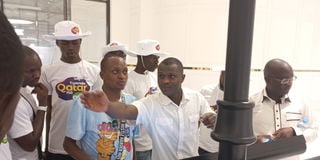Kenyan youth flood Doha in search of jobs

Nation journalist David Kwalimwa (left) speaks to a Justin Wasike, a Kenyan working at the Metro Station in Doha, Qatar.
What you need to know:
- From driving instructors, to taxi drivers, chefs, security detail, airport staff, supermarket attendants, mall assistants, house managers and cleaners, Doha, Qatar's capital is littered with Kenyans from all walks of life
- From my estimate, seven out of ten black workers in Doha will likely be Kenyans, so much that the Swahili language, which has some Arab wordings in it such as Haram and Shukran, is popular as Arab and English
- About 4,000 Kenyans were ferried to Qatar to help organise and stage the tournament
In Doha
Qatar is playing host to the world with the ongoing 2022 Fifa World Cup and whichever way you look at it, Kenyans are an integral part of the success story.
I'm here as part of the 'Qatar Experience' in which dozens of Kenyan football fans have been ferried here by OdiBets to get a taste of the world's most popular sports extravaganza.
Our team is slated to watch Sunday evening's Group 'F' fixture pitting African giants Morocco against bigwigs Belgium at the Al Thumama stadium from 4pm.
During my stay here, I cannot help notice the influence of Kenyans to the success of this tournament.
From driving instructors, to taxi drivers, chefs, security detail, airport staff, supermarket attendants, mall assistants, house managers and cleaners, Doha, Qatar's capital is littered with Kenyans from all walks of life.
At the eight stadia staging the World Cup matches and other venues hosting thousands of visitors for the fan experience, I bump into more Kenyans performing different roles including traffic marshals, human aides, first aid attendants, entertainment handlers and public announcers.
From my estimate, seven out of ten black workers in Doha will likely be Kenyans, so much that the Swahili language, which has some Arab wordings in it such as Haram and Shukran, is popular as Arab and English.
"I've been here for the past 12 years," Salim Abdi, a Kenyan taxi driver, tells me.
"I work 10 hours a day, six days a week inclusive overtime. I do not earn much, but what I get is enough to fend for my family and for savings."

A Kenyan cleaner at the Lusail Mall in Doha, Qatar.
At the magnificent Lusail Mall at the heart of Doha, Evans Olwande, a Kenyan from Busia County, is manning the entrance.
His job description entails welcoming customers and directing them through the expansive building for their shopping needs. He has a huge TV erected on a slab that helps him execute the task.
"I was offered a two year contract for this job by a Nairobi based agency. I've only served two months. It feels good to see Kenyans here," he points out.
Reflecting on suggestions Kenyans working in the gulf face tough times, Olwande maintains any work environment comes with challenges.
"Arabs want submissive employees so you need to understand these people. You have to listen more and cope with the anger outbursts. The positive side is that they pay on time unlike in Kenya where more accomodative employers will not pay you for months. Timely payments are crucial in employment."
"The popular meal here is kubus (special made chapati), bread, rice with so much pepper. There's no Ugali so I have had to adapt."
Kenyans based here reportedly take home between Sh45,000 and Sh150,000 a month, net pay, depending on the job description.

A Kenyan marshal ushers in people at a Metro station in Doha, Qatar.
They are offered accomodation or house allowance but have to cook for themselves. Most homes have gas cookers installed in the kitchen. The train system here, referred to as metro, is free.
Also, there are no electricity, water and Internet bills.
About 4,000 Kenyans were ferried to Qatar to help organise and stage the tournament. They were offered a 60-day training and will serve for the entirety of the month long tournament.
Qatar, which is about the size of Nairobi, Machakos and Nakuru counties put together, has a GDP of 200 billion United States dollars. That's about twice the size of Kenya. The country has an estimated population of 3 million compared to Kenya's 54 million, so arguably there's more resources for everyone here.
Unlike in Kenya, white collar jobs are aplenty here for locals who leave the blue collar opportunities to foreigners.
Kenyans sent home close to Sh450 billion in 2021 according to Statista, putting it at third in sub-saharan Africa, behind Nigeria and Ghana, in remittances.
These remittances are crucial to the country's development and as per records is channeled towards payment of school fees, projects, and savings.
Most of the remittances are wired in from the USA, UK and the Gulf with mothers, wives and girlfriends, in that order, listed as the main beneficiaries.
Government records show remittances from Kenyans abroad are as important for foreign exchange as earnings from tea and coffee.
In a recent visit to South Korea, Foreign Affairs and Diaspora Cabinet Secretary Alfred Mutua, while speaking in the presence of President William Ruto, urged Kenyans in the Asian country not to return home soon, arguing the economy was struggling.
"There are no jobs at home and what we read in the news is not encouraging. Our choice is to make money for investment and take care of our families, educate our kids," says Janet Gathoni, a traffic Marshall at tbe Doha metro station.
She hopes to renew her contract or find another job after the World Cup.
The Qatar government and most employers here reportedly prefer working with Kenyans owing to their dedication at work employers and lesser scandals compared to other African countries.
Kenyans are also said to have a higher grasp of understanding and flexibility to learn new things compared to other Africans.





